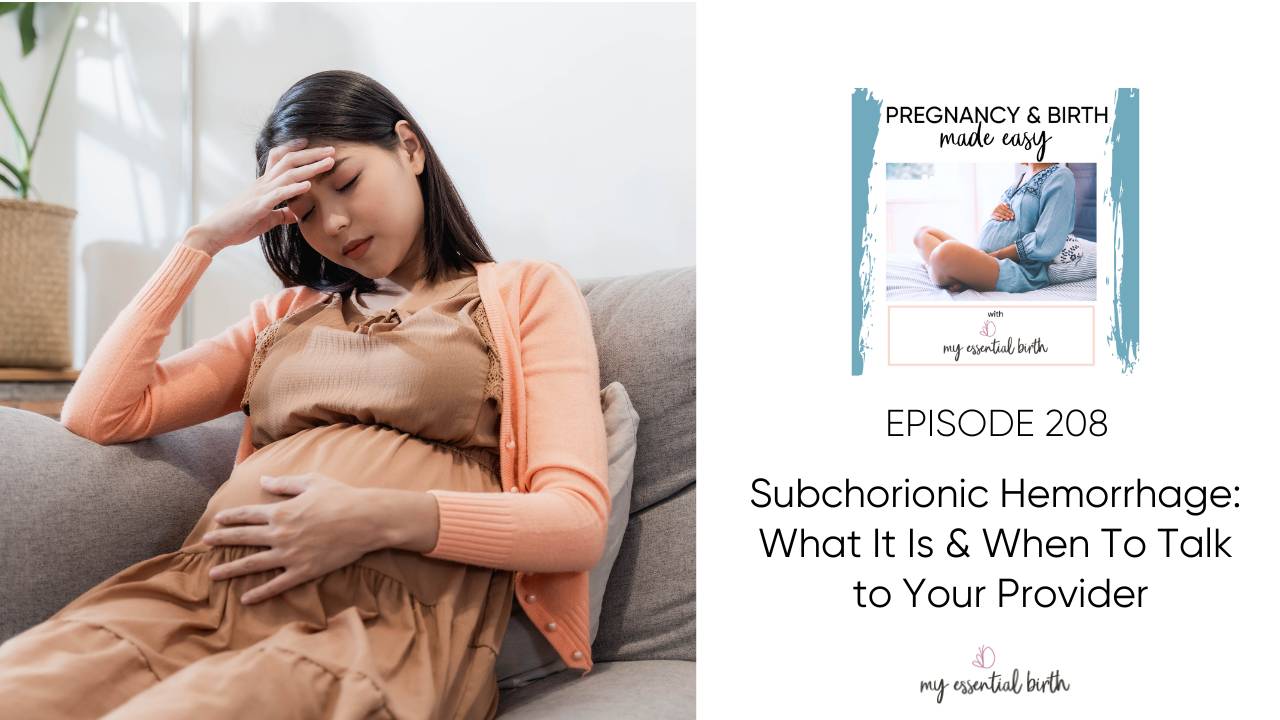Subchorionic Hemorrhage: What It Is & When To Talk to Your Provider

Show Notes:
[2:02] Our Reviewer of the Week, Courtmess412, said, "I am SO thankful for you and for this podcast. Through binge listening daily (haven’t even taken the course yet!), I have no fear or anxiety about delivering my first baby in November. As soon as I found out I was pregnant in March, I started listening to your podcast and feel so empowered, educated and excited for the remainder of my first pregnancy and for birth and postpartum!"
[3:07] Subchorionic Hemorrhage is any kind of bleeding that you have during pregnancy, and it is gonna be scary. The first thought is probably always the worst one like miscarriage or an emergency situation, which are totally valid. Any time that you see, uh, any kind of trickle of blood or there's any kind of bleeding, at any time during pregnancy, then obviously that's time to go see your provider.
[4:47] - What causes a Subchorionic Hemorrhage? At the location where the placenta originally attached to your uterus, a slight detachment can form, and some blood can pool there. Your amniotic sac has two layers to it, an inner layer that is touching and closest to your baby on the inside of that amniotic sac and the outside of the amniotic sac, or that second layer layer is called the corion which is attached to the uterus or next to the uterus.
[6:20] It is actually the most common cause of bleeding between 10 to 20 weeks of pregnancy, and it actually accounts for 11% of all vaginal bleeding that you would have during pregnancy.
[7:15] What are the symptoms? Vaginal bleeding can range from spotting to heavy bleeding with clots. It can sometimes be accompanied by cramping, but that would be a rare occurrence.
[8:07] When you speak to your provider, they will be asking things like "How old is your baby?" They'll be doing all these measurements, looking at blood flow, etc.
[8:18] Who is more at risk for this or what can cause this? Things like uterine irregularities, a history of uterine infections, a history of uterine trauma, history of miscarriage, IVF pregnancy, and high blood pressure can be indicators.
[9:00] When should you call your provider? If you notice any bleeding, any trickle of blood at any time during pregnancy, you should immediately call your provider. If there's like big heavy blood clots, head straight to the emergency room.
[9:36] - How does it affect your pregnancy and your baby? The good news is most of the time these things are gonna resolve. All on their own. Your provider's going to be working with you, and if there is reason for concern or reason that you need to be on bedrest, then that will be a conversation that you guys have and you'll get to decide together.
[10:36] Now, in some rare cases, it can cause miscarriage, preterm delivery, and placental abruption. Most of the time, it is not an issue, but it is associated with an increased risk of pregnancy loss if the hemorrhage accounts for 25% or more of the volume of the sac.
[11:14] Most of the time subchorionic hemorrhage does not harm your baby. However, if you are wondering if there could be a concern, research shows large hemorrhages that occur late in pregnancy can be a little more concerning. Subchorionic hemorrhage in second and third trimesters have been associated with preterm birth and premature rupture of membranes.
[12:48] - Pelvic rest is going to be the number one thing that is recommended. Unfortunately, there's not really much that you can do except for wait for it dissolve on its own.
[14:48] The Rhogham shot for Rh negative mothers is offered a little later in pregnancy. Our episode on the Rhogam shot is linked HERE.
[16:54] Will this make your pregnancy high risk? It depends on how big and how severe the hemorrhage is. Since most of these things do resolve on their own your provider will be able to tell you if you need to be transferred to a high risk doctor. Remember that your provider will continue to monitor with ultrasounds throughout that pregnancy until they resolve.
[18:16] While this can be scary not knowing what is happening, I just wanna send my love to you because there is nothing worse than not knowing if what you're experiencing is going to affect your baby or if it's going to affect you. I recommend the birth course, relaxation practice, meditations, and the Find It and Flip It Exercise.
To Leave a Review ⭐️
- Open Apple Podcasts
- Find “Pregnancy & Birth Made Easy” podcast
- Select “Ratings and Reviews”
- Click the stars!
- Select “Write a Review” and tell us what was the most amazing, comforting, eye-opening thing that you loved!
ALL the best,

Links Mentioned

